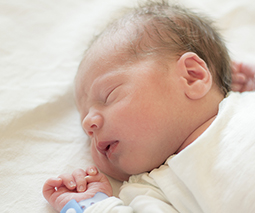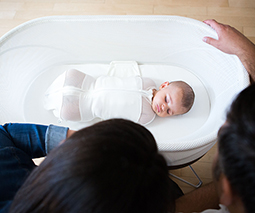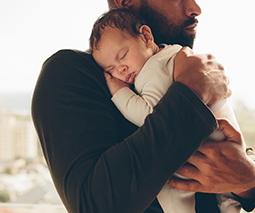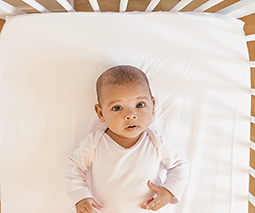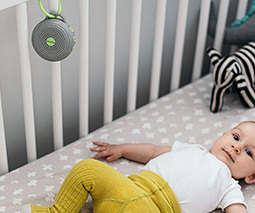Sleep expectations – what to expect in your baby’s first year
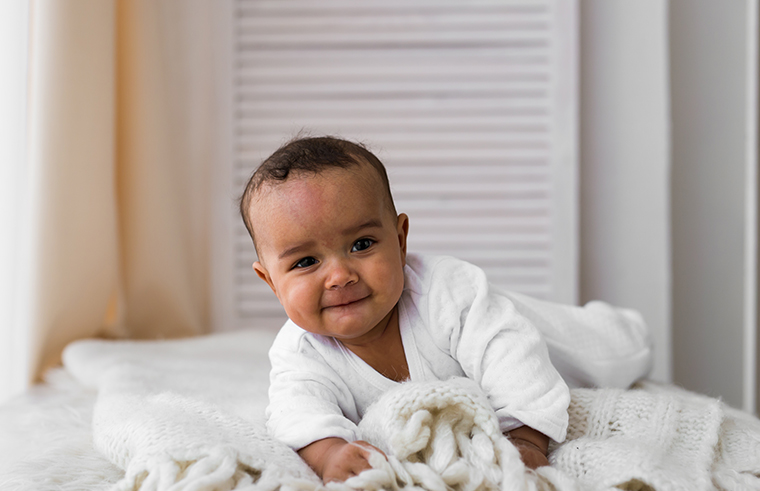
Opinions come flying in thick and fast when you bring your new little baby home from the hospital and arguably one of the top topics is sleep.
Terms to listen out for are ‘routine’ and ‘schedule’. If you hear these in reference to your child who is under 12 months old, tune out because the unnecessary stress of unrealistic expectations is not worth it.
Leading Australian ‘Baby Whisperer’ Katie Forsythe from The Baby Sleep Company says she quite often refunds money to customers because she realises the only ‘sleep’ issue they have is listening to opinions, though well-meaning, of others.
“It’s just a case of them being given unrealistic expectations from friends and family,” Katie says.
Myth-busting nap time

Unrealistic expectations are often behind calls to Katie for help before a baby is six months old.
“One thing a lot of people think, that I don’t actually think is a problem, is a baby may well only sleep one sleep cycle at a time for their naps all the way up to six months – that’s not crazy unusual for them to only nap one sleep cycle at a time and it is perfectly OK, as long as they are having enough of them,” Katie says.
“A good indication that they are ready to get up is if they wake happy – I would not be trying to resettle them, it’s just a waste of time. But, if they wake really upset, then maybe you could spend five or 10 minutes trying to resettle them – but apart from that, I wouldn’t try anything more.”
Katie says often new parents fight a losing battle to increase day nap times.
“Often I have clients who have worked with other sleep consultants previously, have read books or articles online and they’ll tell me, ‘Oh, she wakes from her first nap, she’ll only have 45 minutes, but then I go in to resettle and sometimes it’ll take 50 minutes, but eventually she will go to sleep’,” Katie explains.
“And I am like ‘Well, gosh that’s probably the whole of her next wakeful period, so instead of sitting in the dark room resettling, you probably could have just brought her out, had a sandwich, relaxed together and then put her back down and you would have had the same result’.”
Katie says parents need to stop being so hard on themselves and know that naps on the go are not bad.
“It’s not bad if your baby has a nap in the pram or in the car because you’re out, it’s still sleep and that means your baby is probably going to grow up to be more adaptable,” she says.
Rhythm before routine
Katie says a very popular sleep book in Australia, has many of her clients feeling like failures if their baby doesn’t sleep from 7pm to 7am.
“For some that is just not realistic and causes unnecessary stress,” Katie says. “I always say everything works for someone but nothing works for everyone; it can’t be a one size fits all.”
She says babies can’t read the schedule parents tend to want them to keep.
“I don’t like to think of it being as strict as a routine,” she says. “Certainly children over the age of about six months will have a rhythm, they’ll have general wake and sleep times that parents will start to notice.”
Newborn to six months

A baby’s sleep cycle can last anywhere from 30 to 50 minutes and gradually increases with age.
“A baby’s sleep cycle goes for around 45 minutes, and when they come around to the top of their sleep cycle, they check to make sure if everything is as it should be, before they wake or self-settle,” Katie says.
She says sleep can be all over the place at this early age and that’s why the at-home parent is advised to sleep when the baby sleeps.
“When we talk about babies who sleep through the night, they’re not actually sleeping through the night, they’re becoming conscious but they then go back to sleep without assistance,” she says.
Katie says babies who don’t link their sleep cycles need to sleep more frequently then those who manage to link two or more sleep cycles.
“One or two naps of one or two sleep cycles is not enough,” she says.
“I would then say we are going to work on getting baby down more frequently at first so they are having more sleeps. Sure, it may only be in lots of one or two sleep cycles, but there is more of them.
“Once your baby isn’t ridiculously overtired from having one sleep cycle nap in the day, then they are more likely to start linking their sleep cycles.”
Six to nine months
Katie says this is when parents could start to notice their baby finds a rhythm with sleep.
“It is around six months that we would expect baby’s night time sleep to start consolidating,” Katie says.
“This is also when we expect a little one’s nap to consolidate into three distinct napping times, as opposed to beforehand when they can be a bit all over the shop.”
Katie says she never locks parents into actions they ‘need’ to take to make this happen.
“But, the physiological answer is that a child is probably able to go through the night without milk at the age of six months as long as they are on track growth-wise, development-wise and they’ve started to eat solids,” Katie says.
“However, we do say that if parents have any doubts, they should speak to their doctor first.”
Katie says she always adjusts the time-frame for premature babies. For example, for a baby born two months early, two months gets added to their age to take into consideration developmental delays based on their prematurity, meaning baby should start consolidating sleep at night from around eight months.
“Does it matter if a baby is only waking once of a night? Probably not,” Katie says.
“Parents don’t generally call me if their baby is only waking once, we are usually dealing with a baby waking six or seven times in a night.
“We are happy to err on the side of caution and keep one feed in a night. You can still help the child sleep better and keep one feed in a night; it’s not all or nothing.”
Nine to 12 months
Between nine months and 12 months parents will usually notice baby will drop a day sleep and consolidate into two distinct day sleeps, Katie says.
She says it is around this time in a baby’s life that parents tend to come to her for help.
“Between ten and 12 months is when I find parents are most likely to call me and I think this is for two reasons,” Katie says.
“Firstly, I think people can put up with lots of wakings with very little babies because that is what babies do, but then by the time we are getting to their first birthday exhausted parents are thinking, ‘Hang on a second! Things should be better by now. This is getting a bit ridiculous’.
“I think the other reason is it is typically when people are starting to go back to work so it’s OK waking up three or four times in the night if you get to sleep when baby sleeps the next day but, if you are going to have to go to a job where you need to concentrate, it’s going to be a world of hurt.”
 Need some more baby sleep advice? Our Parent School sleep experts can help. Click to find out more or book a one-on-one session.
Need some more baby sleep advice? Our Parent School sleep experts can help. Click to find out more or book a one-on-one session.

